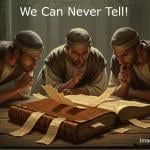Hobby Lobby was not my favorite work experience—it required long hours, ridiculous record-keeping, exposure to monotonous Christian muzak, and putting up with some creepy coworkers. It was, well, retail. Also, I worked there for all of three months. I’ve been a religious historian for far longer and thought I’d share my thoughts on the current case and the evolution of corporate Christianity in general instead of dwelling on those three months of stocking googly eyes. Huffington Post and Businessweek both interviewed me regarding the current SCOTUS case and, while they had good questions, I think that there are some points that have been missing from the discourse. Namely, how is Hobby Lobby related to larger trends? What is actually happening to evangelical religion in the United States? And why are reproductive rights/contraception at the center of this struggle?
Much of the discourse surrounding Hobby Lobby is, necessarily, about corporate Christianity. Of course, Hobby Lobby is a great example of this particular phenomenon and contributes to a larger narrative of the blending of the corporate and religious that has been a theme in American religious history. As our own Darren Grem pointed out, “Religion has been a part of corporate America for quite some time.” I’ll leave this territory to Darren and fellow business and religion scholars—it’s an exciting field and there is obviously much relevance in this work right now. From my own developing research on megachurches, however, I’m considering a slightly different perspective on current trends.
Hobby Lobby may win this case because of the pro-business and conservative nature of the Roberts Court, of course, but there’s a larger cultural phenomenon that might be influencing public and political opinion as well. The case is significant because it represents the blending of corporate and Christian—and one very visible sector of American religion that mixes the same stuff is the rapidly rising megachurch movement. The public and our leadership have been primed to consider the religious rights of corporations because of the general growth of Christian industry and that industry is manifested in tax-free organizations like megachurches. In other words, megachurches and seeker-sensitive churches, in particular, are assisting in blurring the lines between business and religion so that it is difficult to determine where one ends and the other begins.
Read the rest here











